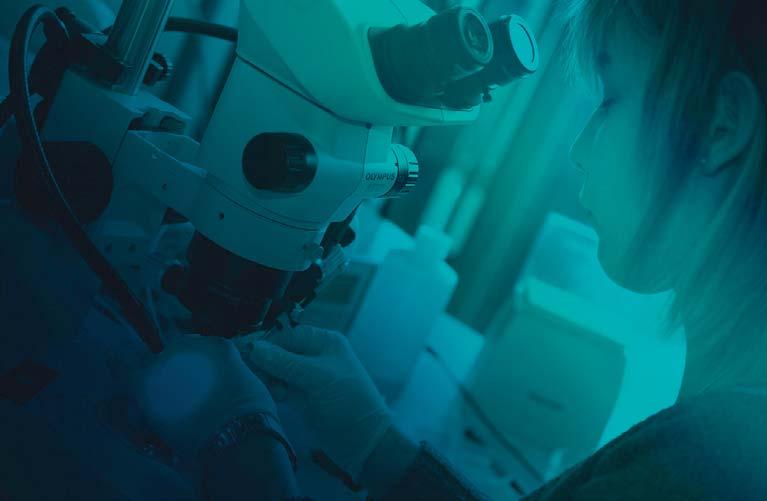© BIG
Saving lives by advancing breast cancer research Interview with Pr David CAMERON, Chair of BIG (Breast International Group), University of Edinburgh Cancer Research Centre, NHS Lothian only global study to test the addition of pertuzumab to chemotherapy and trastuzumab, and demonstrated for those patients with a higher risk of cancer (as evidenced by its spread to lymph nodes) adding pertuzumab gave an additional benefit since it showed a 28% decrease of the risk of recurrence.
C
ould you remind us how BIG started? The Breast International Group (BIG) was created in 1996 by Prof. Martine Piccart and Prof. Aron Goldhirsch as a not-forprofit organisation dedicated to finding the right treatment for every patient with breast cancer. The not-for-profit became a legal entity in 1999, with its headquarters in Brussels. Today, the BIG network unites over 55 groups and reaches across more than 50 countries and 6 continents, connecting thousands of hospitals and more than 10.000 world-class breast cancer experts. Indeed global collaboration is crucial to make significant advances in breast cancer research. Over 20 years later, more than 60 trials have been run under the BIG umbrella, including several landmark trials that have had a real impact on breast cancer treatments. So far, approximately 95.000 patients have taken part in BIG trials all over the world. What is more BIG has invested over 94% of its income in pioneering breast cancer research.
What treatments did BIG help develop within the last 20 years? In addition to these studies with trastuzumab and pertuzumab, we carried out numerous studies in order to improve all types of treatments, be it hormone therapy, chemotherapy, bisphosphonates or radiotherapy. Our goal remains to change the way patients are treated for the better. What do you think are the main challenges in the field of breast cancer research? We remain committed to better understand the biology of various breast cancers and defining the subgroups where particular drugs work for particular kinds of cancer. In that perspective we collect samples of cancers for translational research. Whilst many of our studies are sponsored by the pharmaceutical industry, some trials and research programmes are sponsored by BIG member Groups or BIG as in the case with AURORA, and in all cases BIG (together with other academic groups) retains an independent control over the data and its analysis. Furthermore BIG carries out a variety of fund-raising campaigns in order to obtain relative financial independence. What is more BIG is working more and more with patients and patient advocacy groups: they have become important partners in recent years and BIG should increase its engagement with them in the years to come.
Could you tell us about the international clinical trials you are supporting? Let me start with HERA: this study aimed at testing the benefit of the drug Herceptin® (trastuzumab) in treating women with human epidermal growth factor receptor (HER) 2- positive primary breast cancer. Each year 2 million people – 1% of which are men - are diagnosed with breast cancer worldwide, and you may be aware that HER2-positive breast cancer represents approximately 15-20% of these patients, and is a particularly aggressive form of the disease that previously meant poor survival rates. The first large trial of its kind with 5,102 patients recruited, HERA was designed and coordinated by the Institut Jules Bordet in Brussels together with Frontier Science Scotland and BIG, and enjoyed the financial sponsorship of Roche. It was the biggest, most successful pulling together of data so far, which made it possible to avoid duplication of research. HERA’s results indicated that one year of treatment with trastuzumab, together with other conventional curative treatments such as chemotherapy, had a significant and sustained benefit in preventing cancer recurrence and reduced by 26% the risk of dying. Furthermore two years of the drug was not found to have a significant benefit in comparison to one year of treatment. AURORA is another important, ongoing research study. Its goal is to understand genetic and molecular changes happening in all types of breast cancer when it is first present as well as when it comes back. According to the first results, cancers do change between their first appearance and their reappearance; yet the meaning of these changes and their implications for treatment remain to be clarified.
© BIG
I would also like to mention APHINITY, which focused on further improvements in the chances of cure for patients with HER2 positive primary breast cancer. Building on the results of HERA (and some other similar trials elsewhere in the world) it was the
Workshop about progress in breast cancer research with Her Majesty the Queen of the Belgians on BIG’s 20th anniversary
82

















































































































